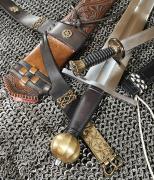http://www.policeone.com/police-trai...r&nlid=7917889
So what do folks think of this? I am also curious if the same analysis would apply to the private citizen gun carrier? It would seem that the officer has a responsibility to be proactive at times in approaching dangerous situations. Thus confidence that you would and could win make some sense.
For a private citizen, discretion may be the better part of valor. Most of us have heard folks or read chatter that has someone saying - why then I will just clear my house! Or I will draw my roscoe, piece or gat and take the bad guy down.
In many of the private citizen training scenarios I've been in, the instructor had scenarios that you should have de-escalated or withdrawn. If not, you were probably killed. We did a burglar in the house one at KRtraining with a team of burglars and the new folks who wandered out of the bedroom to save the TV (Damn, I not letting a scumbag take MY stuff) were eliminated with various degrees of embarrassment. Those who hunkered down won.
Thus, is a no-win one a good lesson for other than officers? Or what do you think of the general idea for police also. The human factor data suggests that realistic FOF or simulations have great benefits. I don't think scenario type has been studied intensively.



 Reply With Quote
Reply With Quote






